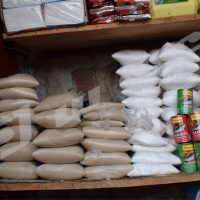On May 12, the Minister of Finance issued a Ministerial Ordinance exempting six food products from tax. Consumers and traders say these products are not enough given the economic situation in Burundi.
 “Cassava and cassava flour, maize and maize flour, rice and dried beans are the products exempt from customs duties, value added tax and administrative charges for the period between 27 April and 27 July 2017”, says the ministerial ordinance signed on 12 May 2017 by the Minister of Commerce, Domitien Ndihokubwayo.
“Cassava and cassava flour, maize and maize flour, rice and dried beans are the products exempt from customs duties, value added tax and administrative charges for the period between 27 April and 27 July 2017”, says the ministerial ordinance signed on 12 May 2017 by the Minister of Commerce, Domitien Ndihokubwayo.
It highlights that the Commissioner General of Burundi Revenue Authority is responsible for the implementation of this ordinance which came into force on April 27, 2017.
Products exempted from tax are not sufficient given the needs of the population
“We welcome the government’s measure to exempt essential food products from customs duties. We hope there will be a slight improvement, “says P. N a young unmarried man from the city of Bujumbura.
For S.G, a father of 3 children, only six products to be exempted from tax are not enough. Given the economic situation in Burundi, the government should extend the list of products to be exempted. “Burundians consume several imported food products. I ask the government to add to the list, other products such as tomato sauce and milk”, he says.
Jean Claude Nkeshimana, a trader operating in the market commonly known as ‘kwa Siyoni’ says he fears that the implementation of this law would not be transparent. “We observe favoritism practice in this country. We ask the government to closely monitor the implementation of this law so that all Burundians benefit from it, “says Nkeshimana.
Noël Nkurunziza, the chairman of the Burundi Consumers’ Association (ABUCO), says these products are not sufficient considering the needs of the Burundian population. He also says the duration of tax exemption set by the government is very short.
On 29 March, Burundian parliamentarians passed a law on the zero-rating of basic food products in order to help Burundians who are in grinding poverty.
In its Humanitarian Response Plan for 2017, the UN states that 3 million people in Burundi require humanitarian assistance. This figure includes 800 000 people who are facing severe food shortages and 56 000 children who are expected to suffer from severe acute malnutrition in the course of 2017.



















 IWACU Open Data
IWACU Open Data

